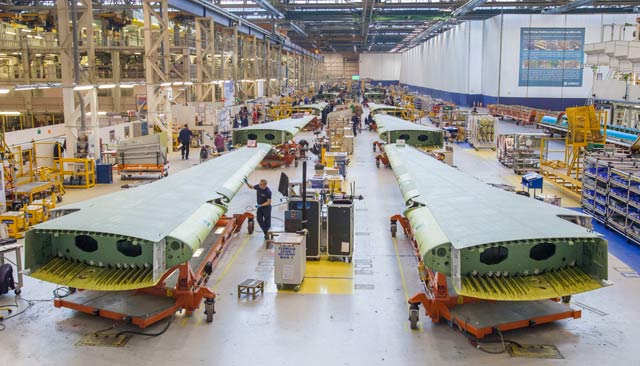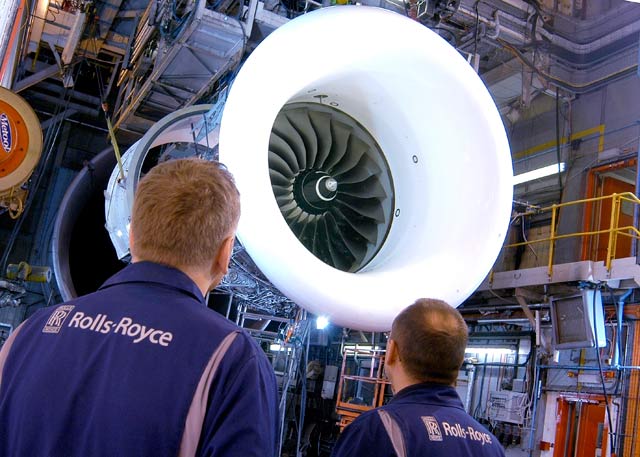The clock is ticking. With the UK having triggered the exit clause on membership of the EU, it is set to leave the 28-nation grouping by the end of March 2019.
UK-based aerospace and defence companies are watching events with great interest and, in some cases, considerable concern. Several were reluctant to speak in detail on problems they could face, because of the uncertainty over what Brexit negotiations will bring. And, when contacted by FlightGlobal in the weeks running up to the 8 June UK general election, some were also wary of making statements that could be deemed to be venturing into the political arena.

Wings for the entire family of Airbus aircraft are made at its Broughton plant in North Wales
Airbus
There is no doubt, however, that the aerospace industry wants a “soft Brexit”, one that continues to give it some form of access to the EU's single market in return for concessions such as allowing the continued free movement of people between the EU and UK.
Win-win
Achieving the best possible outcome post Brexit is the priority for ADS, the UK’s trade association for aerospace and defence. It wants the UK government to aim for an "ambitious" agreement with the EU that includes:
- access to, and influence in, the European Aviation Safety Agency’s regulatory regime, as well as to collaborative European space and R&D programmes;
- access to the EU single market, without companies having to cope with burdensome customs regulations; and
- access to the pool of EU skilled labour.
ADS notes that these access rights have been secured by several other non-EU nations and says they must be a priority for the UK Brexit negotiators. "The UK’s aerospace industry needs the government and its EU partners to agree an ambitious and comprehensive trading relationship," says chief executive Paul Everitt.
“A failure to agree a new trade relationship would undermine competitiveness and threaten the many high-value, long-term jobs our companies sustain in the UK and across the EU.”
Limited impact
Ironically, the UK's largest aerospace company, BAE Systems, believes it will be relatively lightly affected, at least in the short term, by Brexit. "We respect the decision by the British people to leave the EU," it said in a brief comment. "While we await the outcome of the UK's negotiations with the EU, we do not anticipate any immediate or material direct impact on our business."
This is because much of BAE Systems' workload involves the UK, US, Saudi Arabia and Australia, none of which will be affected by EU withdrawal.
One of the largest European defence programmes, Eurofighter, does involve three EU nations – Germany, Italy and Spain – but the four-nation collaboration operates outside the EU's structure.
The UK government has made it clear that it wishes to have a strong, continuing defence relationship with Europe and has signalled the importance it attaches to continued access to European science and technology assets – commitments that BAE Systems welcomes.
Like BAE Systems, engine manufacturer Rolls-Royce was wary of commenting on Brexit in the middle of a UK election campaign. A spokesman referred FlightGlobal to the official ADS stance and noted that group chief executive Warren East had answered questions on the issue at the company’s recent AGM by confirming that while it would not comment on the matter in detail, it was engaged with the UK government on the issue.
Tier One subcontractor GKN Aerospace notes that some 90% of its business is conducted outside the UK and it believes Brexit will not have a significant impact because of the company’s global nature. Speaking at a pre-Paris air show briefing in London in late April, chief executive Kevin Cummings said that while the Brexit impact so far has been positive in foreign exchange terms, in the long term it is not seen as positive. However, he stressed, like other aerospace companies, GKN works very hard to avoid entanglements in any particular government policy, because customers – spread over the globe – like certainty.
The company has much flexibility, having taken pains to establish footprints in North America and Asia. And Cummings is quite right to say of GKN – whose recent acquisitions include Fokker Technologies of the Netherlands and Sweden's Volvo Aero – "We are as European as we are British."
The really big company with most at stake from Brexit is Airbus. The company’s Broughton factory in northwest England makes wings for the entire family of Airbus airliners and its Filton plant, near Bristol, is involved with structures and systems. At Filton, Airbus also has several hundred engineers working on research and technology for future projects.

Rolls-Royce says it is "engaged" with the UK government on the issue of leaving the EU
Rolls-Royce
"In the UK, just like other companies, we are lobbying hard in favour of a soft Brexit," Airbus group chief executive Tom Enders told France’s Le Figaro newspaper in December 2016. “All our planes’ wings – I’m talking about more than 1,200 wings a year – come out of our English plants. What’s at stake is the continuation of our investments in Britain.”
Airbus’s worries were spelled out in detail by Tom Williams, chief operating officer and president of commercial aircraft, when he appeared before the treasury committee of the lower house of the UK parliament in January this year. Airbus is a highly-integrated company, he said: "When we build a set of wings in Broughton, they go literally out the back of the factory into a Beluga, which is a flying truck, which flies them to Hamburg and Toulouse, and a few hours later they are being built into an aircraft.
"We are clearly concerned about anything that disturbs that model, because it is a very seamless, just-in-time process. I would want that to stay in place so that I do not have to go through a complex customs clearing arrangement."
Free movement of personnel is also vital, Williams said: "We have a lot of Brits working in Europe, and a lot of French and Germans working here in the UK. Anything that disrupts that model will create inefficiency and could affect our long-term competitiveness."
"If I have a problem in one of the final assembly lines in Germany or France today, I could call the plant in Broughton, and get 20 mechanics sent to Toulouse first thing tomorrow morning, with their toolboxes, to fix the problem." Retaining that degree of flexibility, said Williams, is vital and he would want to see the final deal between the UK and EU preserving features of the current arrangements.
"We have an expression: if it was not for our wings, it would just be a bus. I remind my European colleagues of that all the time."
But while Williams’s concern about personnel issues being disruptive is probably shared by aerospace bosses across the UK, he may be understating the case. One director of a UK company with entrepreneurial roots in the nexus of academia and industry, and which operates at the cutting edge of aerospace technology, told FlightGlobal that, officially, they expect no change. But, really, there is much concern.
More than half of the technical people on some teams are not UK nationals; the director – a European himself – says these people are real specialists, and it is not unusual to have a vacancy that takes a year to fill. In short, if these people must leave Britain or wish to, it will not be possible to "just replace" them. And, without their capabilities, key contracts will definitely be lost.
Ultimately – and the implication is that the company might consider it prudent to be proactive rather than wait to see if Brexit will work out alright – it will “not be impossible” to relocate to mainland Europe.
Additional reporting by Dan Thisdell
Get all the coverage from the Paris air show
Source: Flight International


























